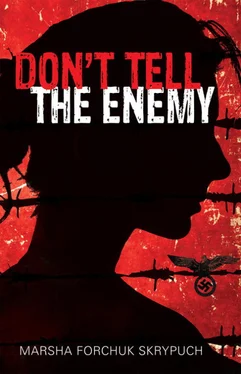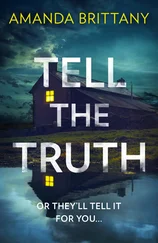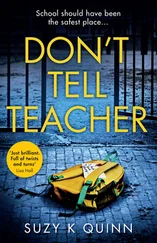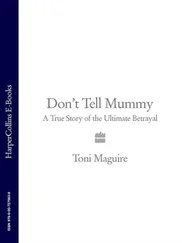With the closing of the ghetto gates, the Commandant decreed that Jews found outside the ghetto without permission would be shot on sight. Slavs who gave Jews food would be shot. And as if that wasn’t enough of a deterrent, the Nazis posted signs all over town claiming that contact with Jews could spread disease.
Chapter Eighteen
The Ghetto
By the beginning of December, barbed wire was installed around the entire two blocks that were now deemed the Jewish Ghetto. There was a single gated entry at the south end, patrolled by police. No one was allowed in or out without a specific reason and the proper papers.
I hadn’t figured out how I was going to pass food and documents through to Dolik and Mr. Segal if I couldn’t get inside.
I hoped that my routine looked innocent to my new Nazi neighbours. Usually by late fall I would still take the cow out of the shed for fresh air twice a day, but she would be eating hay from the loft by this time, not grass in the pasture. If there was snow or ice on the ground, we stayed close to home, because I couldn’t risk her slipping and breaking a leg. But this year, up until now I had still taken Yasna to the pasture twice a day so I could check for documents.
One day Auntie Polina met me at our pasture with all of the food she could scrounge. “I wish I could have brought you more,” she said. “But we’re all suffering. Krasa is now completely dry. If I’m able to get you anything more, I’ll bring it to you.”
From one pocket she drew out a hunk of cheese and a cube of lard wrapped in paper. From a pouch under her coat she brought out a small jar of sunflower oil, six shrivelled apples and a palm-sized wooden box of honeycomb. I put all the cash I had in her hands, knowing full well that in the coming months this food would be far more precious than the money. I wrapped my arms around her. “Thank you, Auntie.”
I took the food back home, keeping some of it for ourselves and hiding the rest for the Segals and Kitais. The question still remained: How would I get it to them?
Without the twice-daily trips to the pasture, it would be harder to check the hiding place for documents. And even if there were some, what would I do with them if I couldn’t make it into the ghetto? Maybe if I slipped out to the pasture every ten days or so, it wouldn’t raise the suspicions of our German neighbours.
Each day since the ghetto had been in place, I’d hidden across the narrow street and watched the police who guarded it, so I could figure out their routine. In the morning and at night when the gates were open and the labour crews were coming and going, there were maybe eight police on duty, but at other times there were only two. One would stay by the gate while the second would slowly patrol the perimeter of the ghetto.
After watching for three days, I knew I could count to one thousand from when the policeman rounded the corner to when he’d reappear on the other side. That was about nine minutes.
On the fourth day, I darted across the road once the policeman had turned the corner. I tugged frantically at various spots in the barbed wire, counting under my breath, looking for a section where the wire wasn’t completely secured and could be pulled wide enough apart to make an opening I could step through. I found a spot between the old candy shop and a bank, then pushed the barbed wire back in place and hurried away. That took about four minutes.
Now that I knew how to get in, I had to figure out when to do it. Dolik lived on the second floor of the old sugar beet factory, and I knew exactly where that was in relation to the candy shop, but there was no point in me sneaking in if everyone was out doing labour. The only time I could be certain that someone would be in the room was during the night.
The next morning I got up before the sun rose and put Mama’s wool coat over my skirt and blouse. Her coat was bulkier than mine and it gave me more places to hide food. In various pockets I hid the honey, three apples, a potato, a wedge of cheese and an onion. If I got through, the Kitais and Segals would have enough food to supplement their rations for a number of days.
If I got caught… Well, I’d be just as dead for smuggling in a single potato, so more was better.
The street was dark and empty and my bare feet made no noise. Moving through the town square, I ducked behind the water pump as a policeman passed by. I got across the street from the ghetto and hid in the shadows, waiting for the policeman to appear on his route. When he rounded the corner, I darted across the road and quickly slipped through the gap in the barbed wire.
I nearly tripped over a ragged man sleeping on the ground, but caught my balance and felt my pockets to make sure none of the food had fallen out. Then I stepped over the man, keeping close to the wall of the old candy store. A policeman was patrolling the inside of the ghetto — and coming my way. I pressed myself into the shadow of the wall and tried to make myself small. He walked right past me.
The sugar beet building was just half a block away, so I walked quickly to it and pulled open the front door. The stench of sweat and disease was so powerful that it nearly knocked me over. Dozens of wheezing, coughing people huddled together all the way up the steps, many of them using their one suitcase as a pillow. Even in the darkness I saw more than one arm or foot wrapped in bloodied gauze. Like the man asleep on the street, these people must not have been able to find or afford a room in the tiny two-block ghetto. And by the smell, there was obviously no place to get clean.
I needed to look like I belonged, so I walked right in and tiptoed up the stairs, trying my best not to step on any fingers. A man roused groggily and pushed over to make room for me. I made my way down the dark second-floor hallway by feeling the wall, dodging more sleeping people crowded together.
I didn’t know exactly where on the second floor the Kitais and Segals would be, so I tapped on the first door.
“What do you want?” asked a man’s voice.
“I’m looking for the lady doctor,” I said. “I’ve injured my arm.”
“She’s at the end of this hallway, on the left.”
When I got to the proper door, I tapped firmly, then stepped in.
Moonlight streamed in through a high window, illuminating the six shapes huddled together for warmth on the bare floor. Each was dressed for winter — shoes and overcoat and all.
Dolik sat up, rubbing his eyes. “Krystia?”
I stepped over to him and knelt so we were eye level. “I’ve brought food,” I said. “But I don’t know when I’ll be able to get more.” I pulled the items out of my pockets and thrust them into his hands.
Nathan sat up and yawned. Leon woke up too. “You could have been shot, coming in here,” said Nathan. “Or robbed, once you got inside.”
“Well, I wasn’t shot or robbed,” I replied. “But it’s risky. We’ll have to think of a better way, if I’m able to get more food.”
What we decided was that I would wait across the street on the days that I had food or documents. We agreed on 4:30 in the morning as the best time, and I would only go out on the mornings when the moon was bright enough for them to see me from across the street. The six of them would rotate turns, so that someone would be at the gap in the loosened barbed wire at the appointed time.
But when was the next time I’d be able to find food to bring? If ever?
Chapter Nineteen
St. Nicholas and Chanukah
Germans celebrate St. Nicholas Day on December 6th, instead of December 19th like we do, and the Commandant’s wife had decided to hold a party in the house for the officers’ children that day. Each was to be given a small wrapped box filled with candy, and even though I was no longer allowed to work in the kitchen, I was one selected to sort the candies and wrap the boxes. My stomach grumbled painfully as I placed small pieces of chocolate and three sugar-dusted squares of Turkish delight into each of the boxes. How I wished I could pop just one candy into my mouth.
Читать дальше



![Quiet Billie - Don't mistake the enemy [СИ]](/books/421973/quiet-billie-don-t-mistake-the-enemy-si-thumb.webp)








